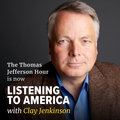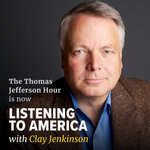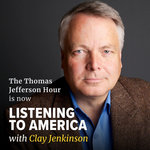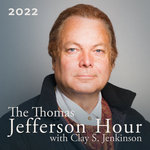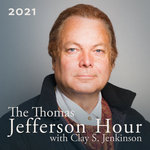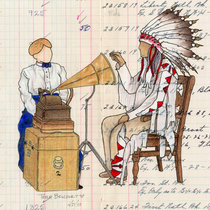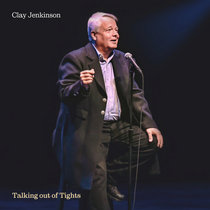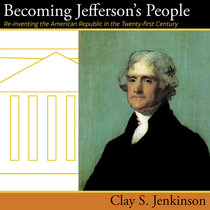
Jamal Khashoggi
from What Would Thomas Jefferson Do? (2018) by Listening to America with Clay Jenkinson
1776 Club exclusive
-
1776 Club
Join now to receive all the new shows Listening to America with Clay Jenkinson creates, including 19 back-catalog releases, delivered instantly to you via the Bandcamp app for iOS and Android. You’ll also get access to supporter-only exclusives like this track. Learn more.Join Now $5 USD/month or more
about
The following is a rush transcript:
DS: 00:01 Good day citizens and welcome to What Would Jefferson Do?, our weekly opportunity to discuss current American events with President Thomas Jefferson, who is seated across from me now. Good day to you, Mr. President.
CSJ as TJ: 00:14 Good Day to you, citizen.
DS: 00:16 Mr Jefferson, recently a reporter was killed. He's not an American citizen, and he wasn't murdered on US soil, but he does have legal residence here. He writes for an American newspaper. I'm wondering sir, how you would react to a situation like this, in a diplomatic sense.
CSJ as TJ: 00:37 Voltaire, who was not a reporter but a philosopher in France, was beaten up by a rich noble, his lackeys, for writing things that the nobleman found offensive to him. So beatings, and tar and feathers, and intimidation of journalists is as old as the world. I'm certain. You know, we in the United States have a fortunate that tradition. The Declaration of Independence says that we are entitled to life, liberty, and the pursuit of happiness. And so clearly this journalist's life and his liberty were taken from him, but not by the United States, thank goodness, by a foreign power. And we have the First Amendment, which is maybe the most powerful doctrine and protection of free speech that exists anywhere on earth, and that is one of Mr Madison's gifts to the American republic. So in our country we don't do that sort of thing and when it happens somewhere else, particularly if there's a tie to the United States as there was in this case, we need to protest firmly without any ambiguity whatsoever. And to say that it simply is the case that the United States does not want to have significant interests with any regime anywhere that would treat a foreign journalist or any journalist in this manner. So in the history of the world, most of these things have never come to the attention of the people. In your age of universal media access and diffusion, events like this suddenly become international crises. So now the question is not what will happen to the country that did this, but what will the reaction be of countries in the world that are dedicated to due process, bills of, rights and the protection of life. Seems to me, this is a test of America's principles. It's one thing to to think about economic dislocations that might occur from a crisis between two nations, but we always have to remember that the primary business of America is to stand for certain ideals, and that if we don't stand firmly for those ideals, it's not clear that other countries will be able to do so either — that the United States, having invented a republic of our sort with the kind of due process that we take for granted, has a special role in the world. Not militarily, but in terms of its principles and its willingness to stand forthright for those principles.
DS: 03:24 I guess the question that remains unanswered for me is: because the gentleman was not an American citizen, what responsibilities do we have diplomatically to stand up for these things?
CSJ as TJ: 03:37 Well, it's often said that George Washington coined the phrase 'no entangling alliances.' It's not so; that certainly was one of his principles in his farewell address, but I actually gave us the phrase, and I mean it — that if the United States engages in alliances with other countries, whether it's France or Portugal or in this case Saudi Arabia, that will have a compromising effect because there's no way the United States can control the activities of those nations.
DS: 04:05 But this is also a case of freedom of the press, sir.
CSJ as TJ: 04:08 Yes, and we should speak boldly on behalf of this journalist and on behalf of freedom of the press anywhere on earth. But whether that leads to war, or economic sanctions or embargo or any other coercive measure, is a question that can only be answered by the people that you've elected into roles of responsibility in your country. My only point is that the United States is a fortress. We have all the natural resources that we could ever need and I hope that we would never be dependent upon any other nation anywhere on earth for anything we needed so that if something like this happened, we could simply turn inward and say, we choose not to have relations with such a nation. Until such time as you investigate, prosecute, and apologize to the world.
DS: 04:55 Thank you very much, Mr Jefferson.
CSJ as TJ: 04:56 You are most welcome, sir.
DS: 00:01 Good day citizens and welcome to What Would Jefferson Do?, our weekly opportunity to discuss current American events with President Thomas Jefferson, who is seated across from me now. Good day to you, Mr. President.
CSJ as TJ: 00:14 Good Day to you, citizen.
DS: 00:16 Mr Jefferson, recently a reporter was killed. He's not an American citizen, and he wasn't murdered on US soil, but he does have legal residence here. He writes for an American newspaper. I'm wondering sir, how you would react to a situation like this, in a diplomatic sense.
CSJ as TJ: 00:37 Voltaire, who was not a reporter but a philosopher in France, was beaten up by a rich noble, his lackeys, for writing things that the nobleman found offensive to him. So beatings, and tar and feathers, and intimidation of journalists is as old as the world. I'm certain. You know, we in the United States have a fortunate that tradition. The Declaration of Independence says that we are entitled to life, liberty, and the pursuit of happiness. And so clearly this journalist's life and his liberty were taken from him, but not by the United States, thank goodness, by a foreign power. And we have the First Amendment, which is maybe the most powerful doctrine and protection of free speech that exists anywhere on earth, and that is one of Mr Madison's gifts to the American republic. So in our country we don't do that sort of thing and when it happens somewhere else, particularly if there's a tie to the United States as there was in this case, we need to protest firmly without any ambiguity whatsoever. And to say that it simply is the case that the United States does not want to have significant interests with any regime anywhere that would treat a foreign journalist or any journalist in this manner. So in the history of the world, most of these things have never come to the attention of the people. In your age of universal media access and diffusion, events like this suddenly become international crises. So now the question is not what will happen to the country that did this, but what will the reaction be of countries in the world that are dedicated to due process, bills of, rights and the protection of life. Seems to me, this is a test of America's principles. It's one thing to to think about economic dislocations that might occur from a crisis between two nations, but we always have to remember that the primary business of America is to stand for certain ideals, and that if we don't stand firmly for those ideals, it's not clear that other countries will be able to do so either — that the United States, having invented a republic of our sort with the kind of due process that we take for granted, has a special role in the world. Not militarily, but in terms of its principles and its willingness to stand forthright for those principles.
DS: 03:24 I guess the question that remains unanswered for me is: because the gentleman was not an American citizen, what responsibilities do we have diplomatically to stand up for these things?
CSJ as TJ: 03:37 Well, it's often said that George Washington coined the phrase 'no entangling alliances.' It's not so; that certainly was one of his principles in his farewell address, but I actually gave us the phrase, and I mean it — that if the United States engages in alliances with other countries, whether it's France or Portugal or in this case Saudi Arabia, that will have a compromising effect because there's no way the United States can control the activities of those nations.
DS: 04:05 But this is also a case of freedom of the press, sir.
CSJ as TJ: 04:08 Yes, and we should speak boldly on behalf of this journalist and on behalf of freedom of the press anywhere on earth. But whether that leads to war, or economic sanctions or embargo or any other coercive measure, is a question that can only be answered by the people that you've elected into roles of responsibility in your country. My only point is that the United States is a fortress. We have all the natural resources that we could ever need and I hope that we would never be dependent upon any other nation anywhere on earth for anything we needed so that if something like this happened, we could simply turn inward and say, we choose not to have relations with such a nation. Until such time as you investigate, prosecute, and apologize to the world.
DS: 04:55 Thank you very much, Mr Jefferson.
CSJ as TJ: 04:56 You are most welcome, sir.
lyrics
"We need to protest firmly without any ambiguity whatsoever."
— Clay S. Jenkinson portraying Thomas Jefferson
— Clay S. Jenkinson portraying Thomas Jefferson
credits
from What Would Thomas Jefferson Do? (2018),
released January 3, 2018
jeffersonhour.com/blog/1311wwtjd
jeffersonhour.com/blog/1311wwtjd
license
all rights reserved
tags
about
Listening to America with Clay Jenkinson
The Thomas Jefferson Hour is a weekly radio program dedicated to the search for truth in the tradition of Thomas
Jefferson.
Nationally acclaimed humanities scholar and award-winning first-person interpreter of Thomas Jefferson, Clay S. Jenkinson, portrays Jefferson on the program, and he answers listener questions while in the persona of our third president.
... more
contact / help
Listening to America with Clay Jenkinson recommends:
If you like Listening to America with Clay Jenkinson, you may also like:

